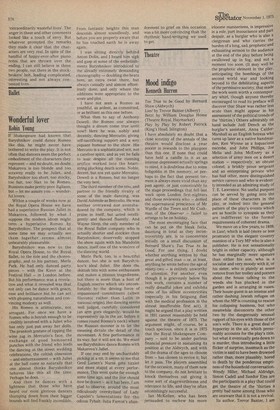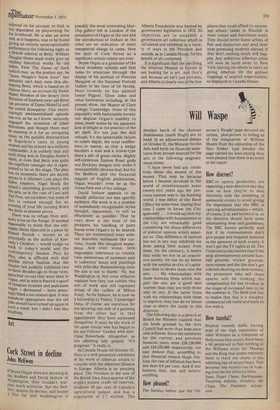Theatre
Mood indigo
Kenneth Ilurren
Too True to be Good by Bernard Shaw (Aldwych) Lies! by Trevor Baxter (Albery) Betzi by William Douglas Home (Theatre Royal, Haymarket) Play by Play by Robert Patrick (King's Head, Islington) I have absolutely no doubt that a close scrutiny of the annals of the theatre would disclose a year poorer in rewards to the playgoer than this one. If none that could have held a candle to it as an interest-depressant actually springs to mind, it is doubtless due to some hobgoblin in the memory, or perhaps to the fact that present torment is always more vivid than any past agony, or just conceivably to the stage proceedings that fell last week upon London first-nighters and those reviewers who — denied the supernatural prescience of Mr Wardle of the Times and Mr Cushman of the Observer — failed to arrange to be on holiday.
The most encouraging face that can be put on the bleak facts, daunting in total as they incontrovertibly are, is to concentrate initially on a small discussion of Bernard Shaw's Too True to be Good. For one thing, I doubt whether anything written by that great and gifted man — or, at least, anything he wrote before the age of ninety-two — is entirely unworthy of attention. For another, even though it is grievously below his best work, contains a number of really dreadful jokes and exhibits some of his silliest eccentricities (especially in his fatiguing duel with the medical profession in the almost insufferable first act), it might be argued that a play written in 1931 cannot reasonably be held against the theatre of 1975. The argument might, of course, be a touch specious, since it is in 1975 that the Royal Shakespeare Company — said to be under parlous financial pressure in sustaining its position at the Aldwych, and with all the drama of the ages to choose from — has chosen to revive it; but let it pass. The players assembled for the occasion, many of them new to the company, do-not hesitate to knock themselves out giving it some sort of stageworthiness and relevance to life, and they're often astonishingly successful.
Ian McKellen, who has been persuaded to eschew his more
irksome mannerisms, is impressive in a role, part insouciance and part despair, as a burglar who is also a clergyman and who carries the burden of a long, sad, prophetic and exhausting sermon to the audience at the end of the play before being swallowed up in fog, and not a moment too soon. (It may well be the prophetic element in the play, anticipating the bombings of the second world war and looking beyond to the debilitating aspects of the permissive society, that made the work seem worth a contemporary whirl, though anyone thereby encouraged to read its preface will discover that Shaw was rather less acute than might appear in his assessment of the political trends of the 'thirties.) Others admirably on hand include Judi Dench as the burglar's assistant, Anna CalderMarshall as an English heiress who turns up later as a native handmaiden, Ken Wynne as a loquacious microbe, and John Phillips, Joe Melia and John McEnery as a selection of army men on a desert station — respectively, an obtuse colonel, a briskly pious sergeant and an enterprising private who has had other, more distinguished service careers and who is evidently intended as an admiring study of T. E. Lawrence. No useful purpose can be served by going into the place of these characters in the play, or indeed into the general pattern of the play's events which are as hostile to synopsis as they are indifferent to the formal requirements of coherent drama.
We move on a few years, to 1939, in Lies!, which is laid (more or less prostrate) in the elegant country mansion of a Tory MP who is also a publisher. He is not sensationally bright in either capacity, although he has marginally more upstairs than either his son, who is a socialist and very moody with it, or his sister, who is plainly at some remove from her trolley and potters about the house talking to the weeds she has plucked in the garden and is arranging in vases. Their house-guest is an intense and rather dashing Jewish refugee on whom the MP is counting to rescue his collapsing business, but wh& meanwhile disconcerts the other two by the dangerously sensual rapport of his eyes with those of the son's wife. There is a great deal of hypocrisy in the air, which presumably accounts for the play's title, but what it eventually gets down to is murder, thus introducing a little flicker of surprise, inasmuch as the victim is said to have been drowned rather than, more plausibly, bored to death by the ponderous emptiness of the household conversation. Wendy Hiller, Michael Aldridge, Simon Cadell and Sandor Eles are the participants in a play that could get the theatre of the 'thirties a pretty battname among those who are unaware that it is not a revival.
Its author, Trevor Baxter, I am
The November 1, 1975
relieved on his account to find, is not dependent on playwriting for his livelihood. He is also an actor and, as it happens, was to be found giving an entirely unexceptionable Performance the following night as a British admiral in Betzi. William Douglas Home must really give up reading historical works by old ladies. First The Dame of Sark (which may, as the posters say, be "Anna Neagle's finest hour" but certainly isn't his); now this dismaying Betzi, which is based on St Helena Story, an account by Dame Mabel Brookes of the dreary little flirtation of fourteen-year-old Betzi (an ancestor of Dame Mabel's) and the exiled Bonaparte. This excruciatingly sentimentalised episode has not, as far as I know, seriously engaged the attention of other historians, and though there may be material in it for an intriguing essay on the parallel deterioration in Napoleon's taste in young women and his stature as a military commander, it is unlikely that any such thing was in Douglas Home's mind, or even that Betzi was quite the repellent teenager she is repre sented to be on the stage. The play has its moments; there are decent actors in it (Herbert Lom plays the fallen emperor, Nigel Stock the island's unyielding governor); and the sets, as in the case of Lies! and Too True, are excellent; but none of this is reward enough for an evening of your life running down the drain at present prices.
There was no refuge from antiquity even on the 'fringe'. It seemed reasonable to think that the estimable Sheila Hancock in a piece by Robert Patrick known to us Principally as the author of Kennedy's Children would nudge us back to today's world and the contemporary theatre. Play by PlaY, alas, is afflicted with that terrible mirror fixation that the theatre last publicly exhibited two or three decades ago in those twee, Parochial revues that were then in vogue, and in which Patrick's spoof Of thespian rivalries and jealousies might decimated have amusingly filled a ten-minute spot. It was somehow appropriate that the old Joke should have turned up again in such a week, but I didn't feel like laughing.

































 Previous page
Previous page